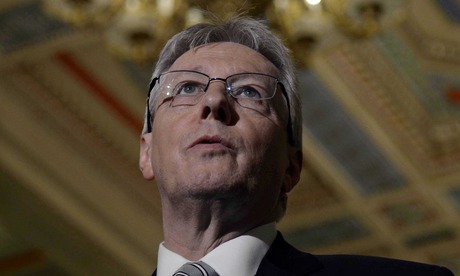Agreement has been reached on a range of disputes that had undermined power-sharing in Northern Ireland, following 11 weeks of discussions.
The deal announced on Tuesday has resolved destabilising wrangles over the administration’s budget and its non-implementation of welfare reforms while establishing new structures to deal with the legacy of unsolved killings during the Troubles.
But the vexed questions of flying flags and controversial, often banned, marches have in effect been shelved with the creation of a special commission that will investigate individual localised issues such as a parade in North Belfast that has resulted in serious sectarian disorder.
The power-sharing government in Belfast will be handed £2bn to cushion the impact of welfare reforms and cuts over the next decade that the parties finally agreed on.
The extra cash will also be used to fund a new institution to investigate the legacy of the Troubles, the treatment of victims from the conflict and the thousands of unsolved crimes from 1969 onwards.
All of the five main parties in the Stormont executive indicated on Tuesday afternoon that they would be recommending that their membership endorse the agreement, which has 75 sections dealing with a range of contentious issues left over from the peace process.
The region may also be allowed to set its own corporation tax rate – closer to the level of the Irish Republic’s 12.5% rate. Theresa Villiers, the Northern Ireland Secretary, said if the parties ratified the agreement brokered today legislation could be put through parliament in January to devolve corporation tax poweres to the region.
David Cameron said he was delighted to see a deal reached. “This agreement means the UK government has been able to offer a significant financial package that opens the way for more prosperity, stability and economic security for Northern Ireland,” he said.
The parties in Stormont were close to triggering an election as the two main forces in government – Sinn Féin and the Democratic Unionist party (DUP) argued over welfare reforms. Unable to set a budget in the summer, the DUP threatened to pull down the government, claiming the administration was not viable.
The Irish foreign minister, Charlie Flanagan, who co-chaired the talks with the Northern Ireland secretary, Theresa Villiers, said that “in the bleak mid-winter” an agreement had been forged to bring about “brighter days in Northern Ireland”.
Villiers said: “This is a reasonable and balanced agreement that opens the way to a more prosperous, stable and secured future for Northern Ireland. It responds to the wishes of the great majority of people in Northern Ireland, who clearly want their politicians to find an agreed way forward.
“I pay tribute to all those involved, who have shown real leadership and imagination. We have had well over 100 hours of formal talks in this process, and a great deal more informal negotiation.
“This is a historic agreement, giving us an agreed approach to some of the most difficult issues left over from Northern Ireland’s past. It offers us a new start, and a far more hopeful future.”
The first minister, Peter Robinson, described the deal as a “monumental step forward” for Northern Ireland.
The DUP leader said he would be calling on his party to back the deal. Robinson said the financial aid package could create between 50,000 to 60,000 new jobs.
The Sinn Féin president, Gerry Adams, confirmed later that he too wanted his party to endorse the deal. Sinn Féin, however, did not achieve its aim of an Irish Language Act that would have put Gaelic on the same par as English in Northern Ireland – a policy that has been a key goal.
Barack Obama issued a statement from Hawaii, where he is on holiday, praising the deal, saying it had been reached with will and courage and would help Northern Ireland deal with issues that had plagued its past. The US president said he was looking forward to the deal being ratified and to the peace process continuing to advance.
The main clash over 11 weeks of talks between Sinn Féin and the DUP focused on a row about welfare reform. Up until the Tuesday’s agreement, Sinn Féin had resisted major reforms to the welfare system and the public sector. The £2bn offered by Westminster will help sell those reforms to Sinn Féin’s supporters.
Failure to secure an agreement on welfare and the budget for the province could have resulted in the collapse of the power-sharing executive in Belfast. It would have also triggered another Assembly election, which none of the parties wanted.
Part of the £2bn aid package the parties secured will be raised through the sale of public assets such as Belfast harbour as well as Treasury loans and grants.
Martin McGuinness, the deputy first minister and a Sinn Féin leader, said the deal was “a remarkable achievement”, especially on issues such as dealing with the past. “Against all the odds we have forged the way forward,” he said.
McGuinness said that tens of millions of pounds from the aid package would be used to help integrate schools and create a more shared environment for pupils across the sectarian divide.
But the centrist Alliance party and the nationalist Social Democratic and Labour party (SDLP) each expressed concerns over the details of the deal.
The Alliance leader and justice minister, David Ford, said that of the creation of a commission to deal with controversial marches “the can has been kicked down the road again”. But Ford said his party would still back the broader agreement, adding that the Alliance “remains committed to holding others to account for the promises they have made”.
The South Belfast MP and SDLP leader Alasdair McDonnell said that the deal fell short of the comprehensive agreement they had wanted.
McDonnell said it was disappointing that the agreement failed to include any new inquiry into the 1989 murder of the Belfast lawyer Pat Finucane and a bill of rights for Northern Ireland. However, he said the SDLP would still back the agreement after consultations with the party’s membership and also organisations representing victims of the Troubles.
Ulster Unionist party leader, Mike Nesbitt, said that while no party could give the agreement 100%, he would be recommending that his party give the deal “a fair wind”.
The agreement does not mean that controversies such as the banned Orange Order parade along Belfast’s Crumlin Road have been solved. Orangemen and their supporters have organised a street camp since July 2013 in protest against the march ban. Protests against the ban in that year triggered days of rioting and sectarian disorder along one of the most dangerous “sectarian interface areas” between the Protestant Shankill/Woodvale areas and the Catholic Ardoyne.











